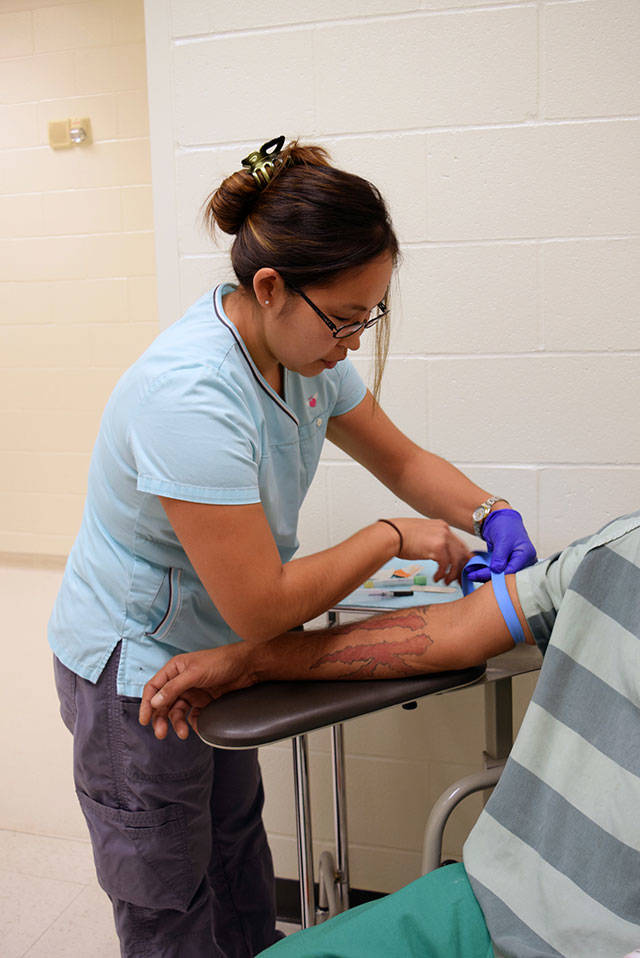EVERETT — As opioid addiction surged in Washington in recent years, the Snohomish County Jail earned an unenviable reputation as the community’s largest detox center.
That’s where many addicts repeatedly have wound up, caught in a cycle of drug use, homelessness, crime and arrests.
Starting this week, the lockup in Everett also may become known as the place where some drug-addicted detainees received the medical help they needed to start toward recovery.
The jail is among the first statewide to offer medication-assisted detox for opioid addiction. The pilot program is part of the community’s coordinated response to a drug problem now considered an epidemic.
A select group of inmates at the jail will be offered access to prescriptions for Suboxone and other buprenorphine-based compounds known to help ease withdrawal symptoms and improve chances of beating addiction.
The program will start small and eventually involve up to 25 carefully screened people at a time. Each will be treated while under supervision by jail medical staff over a period of about five days.
The compounds are known to work in as little as a few hours to reduce the cravings, nausea and other symptoms that can make withdrawal from opioid addiction a particular torment — and a challenging problem to manage behind bars.
The idea is to not only address the symptoms and health issues associated with withdrawal, but also to let jailed addicts “know how good it feels to be on a medication that helps them,” said Alta Langdon, a nurse practitioner who is the health services administrator for the county corrections bureau at the sheriff’s office.
Those prescribed medication-assisted detox will be offered counseling in the jail and will be connected with treatment providers and social services agencies that can assist them in making arrangements to help maintain sobriety upon release.
Some in the detox program eventually may wind up being prescribed Suboxone long-term as medication-assisted treatment for their addiction, but that’s not being offered at the jail.
The medication-assisted detox option only will be offered to detainees who live in the county, who likely will be at the jail for at least six weeks, and who aren’t expected to be headed to prison once their cases are resolved.
A desire to get clean and stay that way also is key, Langdon said.
“There has to be a readiness for change,” she said.
A recent sheriff’s office examination of jail bookings found that of the 50 people who top the list for cycling in and out of the jail, roughly 85 percent have a history of treatment for opioid withdrawal while in custody. Among that group, the top three detainees all are reported to be in their 30s and have more than 40 arrests apiece.
People undergoing withdrawal from opioid addiction need to be carefully monitored. That’s meant the jail’s medical unit has routinely operated above its designed capacity.
Medication-assisted detox is attractive in part because detainees who aren’t suffering withdrawal symptoms can be placed more quickly in the jail’s general population.
“This is going to open up a lot of options for us,” Corrections Bureau Chief Tony Aston said.
Corrections deputies and other jail staff were informed of the pilot program in an all-hands email Friday.
“While we will never be able to arrest or incarcerate our way out of the opioid epidemic, we have an obligation to provide safe and secure housing for those who are arrested and brought to our jail,” Corrections Maj. Jamie Kane wrote. “Conversely, incarceration can be an opportunity to detox and provide some clarity for those suffering from addiction. In some cases, it can be the catalyst for them to seek help to break the cycle of addiction.”
A priority of the detox pilot program will be connecting participants with appropriate service providers prior to release, Kane added.
The detox initiative is separate from a diversion center the county plans to open in March in the former work release center.
The diversion center will be a place where people living on the streets can be brought for temporary housing, medical attention and social services as soon as they ask for help. People at the diversion center won’t be under arrest. They will be brought there by deputies working with social workers, a team known as the sheriff’s Office of Neighborhoods.
People at the diversion center also will be offered medically supervised access to Suboxone and other addiction-fighting drugs. They, too, will be connected with social service agencies and programs that can help them avoid returning to addiction and homelessness.
Gov. Jay Inslee last week visited the future diversion center and said the idea ought to be replicated across Washington.
State lawmakers are considering legislation to fund the diversion center as a test project for the state. It is being championed by Rep. Dave Hayes, R-Camano Island, and Sen. Guy Palumbo, D-Maltby.
The jail’s Langdon said that helping homeless addicts get off drugs is only part of the puzzle. They also need to be connected with social services that will help them rebuild their lives.
“It is impossible for them to stay sober if they don’t have medical insurance, temporary shelter, shoes. Some don’t have shoes,” she said.
Scott North: 425-339-3431; north@heraldnet.com. Twitter: @snorthnews.
Talk to us
> Give us your news tips.
> Send us a letter to the editor.
> More Herald contact information.


























